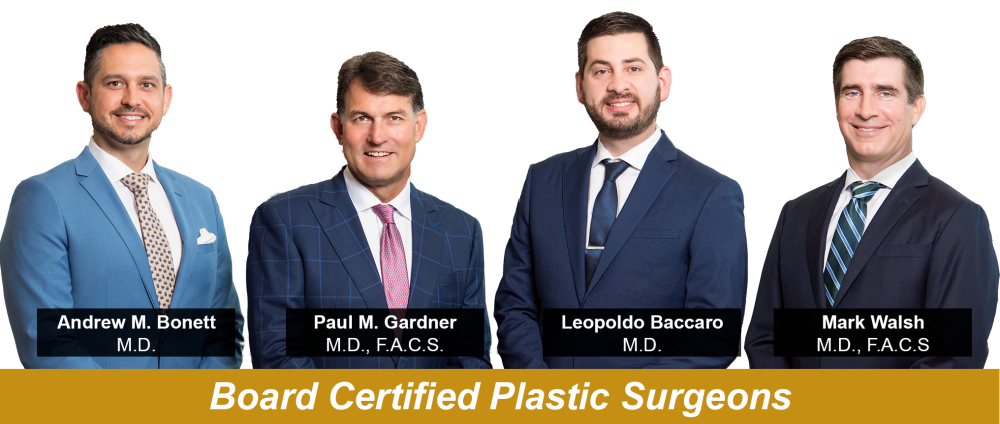
Will My Gynecomastia Ever Go Away?—What to Do if it Doesn’t
Naples Plastic Surgery has earned a stellar reputation for helping men overcome gynecomastia. A medical condition that causes male breast tissue enlargement commonly referred to as “man boobs,” the affliction can significantly impact a man’s self-confidence. Most men don’t know who to talk to about their condition, leaving them with many unanswered questions.
Drs. Paul Gardner, Leo Baccaro, Mark Walsh, and Andrew Bonett know how difficult it can be for men to discuss this often-embarrassing condition. With expertise in treating gynecomastia, they have helped many men understand the causes of the condition and guided them on treatment options. If you or someone you know has symptoms suggestive of gynecomastia, read on to learn more.
What Causes Gynecomastia?
Hormonal imbalances between testosterone and estrogen levels are believed to be responsible for most cases of gynecomastia. Because of the natural flux of hormone levels during adolescence, up to 25% of pre-teen and teenage boys experience the condition, though most of these cases resolve themselves naturally. Gynecomastia in adult males tends to be most prevalent in those with a genetic predisposition carried down from male relatives. Numerous conditions and other factors can disrupt hormone balances and potentially cause gynecomastia symptoms, including:
- Adolescent gynecomastia that doesn’t resolve
- Side-effect of certain medications
- Chemotherapy
- Anabolic steroid use
- Recreational cannabis
- Excess alcohol consumption
- Malnutrition
- Liver disease
- Kidney disease
- Lung cancer
- Low testosterone
- Hypogonadism
- Hypothyroidism
- Testicular cancer
- Obesity
- Trauma or injuries
- Adrenal dysfunction
How to Tell Whether You Actually Have Gynecomastia?
Enlargement of male breasts is not always true gynecomastia; rather than through breast tissue growth, the enlargement is caused by fat buildup. Such non-gynecomastia enlargement can be addressed with diet and exercise. True gynecomastia is typically marked by having excess levels of estrogen, which, along with enlarged breasts, can cause other symptoms in men, including:
- Lumps beneath the skin of the chest cavity
- Tender or sore breasts
- Low sex drive
- Decrease in muscle mass
- Increase in belly fat
- Constant fatigue
- Emotional instability and depression
- Hypertension
Because gynecomastia symptoms vary among men and can be like other medical condition symptoms, doctors usually conduct several diagnostic procedures to confirm a diagnosis, including:
- Blood, liver function, hormone level, and urine tests
- Mammogram
- Biopsy
Will Gynecomastia Symptoms Subside Naturally?
As previously noted, adolescent gynecomastia symptoms usually resolve as teens age into adulthood. However, about 5% of teenage cases remain unresolved into adulthood due to continuing imbalances in hormone levels. The longer such cases remain unresolved as the men age through their twenties, the less likely they will resolve themselves.
Some cases of gynecomastia caused by outside factors may be relieved by lifestyle changes that help restore natural hormone levels. Such lifestyle changes include:
- Reduce alcohol intake
- Quit recreational cannabis
- Don’t use steroids
- Consume testosterone-rich foods
- Eat a balanced diet
- Get more exercise
Resolving the underlying medical-related causes of hormone imbalances can also help reduce gynecomastia symptoms. If a medical condition, medications, or other treatment is causing the hormone imbalance, balance will likely be restored once the condition has been successfully addressed or when relevant medications/treatment are no longer needed.
While the natural restoration of hormone balance will help control gynecomastia, it may not lead to a reduction of the enlarged breast tissue it already caused. At best, it will take time for the already enlarged tissue to subside.
What Are the Treatment Options?
Testosterone treatment and several drugs can be used to control gynecomastia and reduce the size of enlarged breasts in males. The success of these treatments is often dependent on the patient’s body composition and lifestyle, and they usually take time to achieve noticeable results. For this reason, many men opt to combine these treatments with male breast reduction surgery, and some gynecomastia cases can only be resolved by surgery.
Gynecomastia surgery removes and shapes a man’s breast tissue to improve its tone and produce a slimmer chest physique. Recommended surgical options might primarily rely on liposuction or involve surgical excision of tissue combined with liposuction, depending on skin quality, skin thickness, fat deposits, breast tissue levels, and the shape and size of the enlarged breasts. The skilled surgeons at Naples Plastic Surgery customize every male breast reduction surgery to meet each patient’s specific needs and aesthetic goals.
Learn More with Naples Plastic Surgery
If you would like to learn more about gynecomastia and consult with our experienced surgeons about your medical treatment options, we would be glad to speak with you personally. For all your esthetic concerns, contact Naples Plastic Surgery today at 239.566.2611 to schedule your initial consultation.

